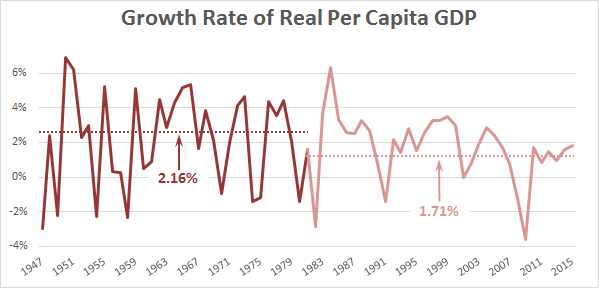Steven Pearlstein suggests that Donald Trump’s deal with Carrier is part of a larger strategy aimed at changing norms of behavior:
There was a time in America when there was an unwritten pact in the business world — workers were loyal to their companies and successful companies returned that loyalty….Then came the 1980s, and all that began to change as American industry began to falter because of foreign competition….So the social norm changed….Although the public never much liked the idea of closing plants and shipping jobs overseas, it no longer was socially unacceptable.
Now comes Donald Trump — in the public mind, a successful businessman — who as the new president, suddenly declares that the new norm is not longer acceptable, and he intends to do whatever he can to shame and punish companies that abandon their workers….He knows that he and his new commerce secretary will have to engage in a few more bouts of well-publicized arm twisting before the message finally sinks in in the C-Suite. He may even have to make an example of a runaway company by sending in the tax auditors or the OSHA inspectors or cancelling a big government contract. It won’t matter that, two years later, these highly publicized retaliations are thrown out by a federal judge somewhere. Most companies won’t want to risk such threats to their “brands.” They will find a way to conform to the new norm, somewhat comforted by the fact that their American competitors have been forced to do the same.
I mostly disagree with this. I think the “norm” Pearlstein is talking about here is actually just ordinary economic reality. During the postwar economic boom, American companies didn’t need to offshore jobs, so they didn’t. Nor did they need to lay off workers or downsize their companies frequently. America was the most efficient manufacturer around, and there was plenty of money sloshing around for everybody. So why invite trouble?

When the postwar boom came to an end, businesses changed. We learned that what we thought had been a permanent new norm, was no such thing. It was just a temporary, three-decade blip. Starting in the 80s, as economic growth leveled off, the business community returned to operating the same way businesses had operated ever since the beginning of the Industrial Revolution.
I suspect Pearlstein is right about what Trump is trying to do. He’ll engage in some naming and shaming, and on a few occasions he’ll try to set an example by going after companies in semi-legal or outright illegal ways. It might even work a little bit, and it will almost certainly work in a PR sense. But more generally, Trump can’t keep the tide from coming in any more than any other president. It’s not as if the offshoring phenomenon is peculiar to America, after all.
The good news, such as it is, revolves around automation. Within a decade or so, most manufacturing work will be so highly automated that it won’t matter much where it’s made. We’re already starting to see signs of this. That will put an end to large-scale offshoring, but unfortunately, it will be even worse for blue-collar workers. We’re on the cusp of an era when tens of millions of workers will be put out of jobs by automation, and we’d better figure out what we’re going to do about that. But one thing is certain: whatever the answer is, it’s not naming and shaming.

















